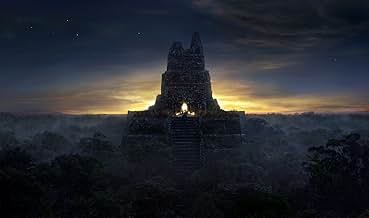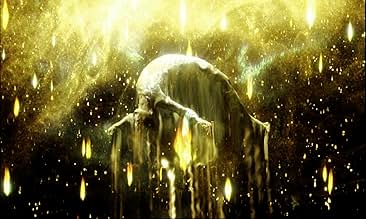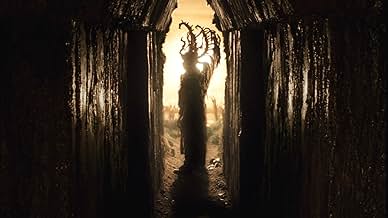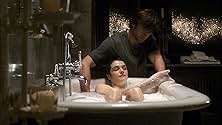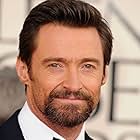As a modern-day scientist, Tommy is struggling with mortality, desperately searching for the medical breakthrough that will save the life of his cancer-stricken wife, Izzi.As a modern-day scientist, Tommy is struggling with mortality, desperately searching for the medical breakthrough that will save the life of his cancer-stricken wife, Izzi.As a modern-day scientist, Tommy is struggling with mortality, desperately searching for the medical breakthrough that will save the life of his cancer-stricken wife, Izzi.
- Awards
- 9 wins & 38 nominations total
Alex Bisping
- Foot Soldier Del Toro
- (as Alexander Bisping)
Featured reviews
It is essential to let go of needs and allow for something new, something more peaceful, to take its place. The main issue for people is not to advocate any specific worldview or philosophy, but rather to show that death is natural to life and something that everyone has to face. It is when people find some way of reconciling with mortality that they can fully be present and not be too worried about the world around them. Our lives are brief and are at the mercy of forces beyond our control, which can suffocate consciousness and delude people into falsehood.
"TheFountain" is a story tackling three different time periods. Tomas (Hugh Jackman) is a 16th century Conquistador on a bloody hunt though a hidden Mayan temple to retrieve sap from the mythical Tree of Life for his queen (Rachel Weisz), who is desperate for immortality. In 2005, Tom (Jackman) is a doctor frenetically searching for the cure to cancer to save the life of his wife Izzi (Weisz), who is in the final throes of her battle with death. Five hundred years later, Tom travels through space on a quest to reach the place of tranquility that Izzi spoke fondly of, using the Tree as a device to get him to the answers he needs to rest his weary mind....
In performances that can only be described as exquisite, Jackman and Weisz assist their director in opening up this knotty story through their soulful and romantic interpretations of desperation and peace. Essentially playing one lost soul, Jackman foams with remarkable anguish as he performs three separate interpretations of duty, handing in career-defining work. Weisz is the face of love in "The Fountain," lending the film a flowering emotional core of the film.
The Fountain" is masterful on so many unique levels, presenting a demanding filmgoing experience that should elicit a grand sense of awe on an emotional and spiritual level unlike anything you've seen this year.
Aronofsky has out done himself again....
In performances that can only be described as exquisite, Jackman and Weisz assist their director in opening up this knotty story through their soulful and romantic interpretations of desperation and peace. Essentially playing one lost soul, Jackman foams with remarkable anguish as he performs three separate interpretations of duty, handing in career-defining work. Weisz is the face of love in "The Fountain," lending the film a flowering emotional core of the film.
The Fountain" is masterful on so many unique levels, presenting a demanding filmgoing experience that should elicit a grand sense of awe on an emotional and spiritual level unlike anything you've seen this year.
Aronofsky has out done himself again....
This is one half of a review. Some films need to be seen more than once to be fully grasped. This is one of them.
I would like to read Paul Schrader's review of this film. Not because he wrote the screenplay for Taxi Driver, but because he wrote a book about "Transcendental Style in Film" and "The Fountain" is certainly in this category of film-making.
Because of Schrader's book, I've been viewing as many films by Dreyer, Ozu, and Bresson, that I can lay my hands on especially those by Robert Bresson. There are many parallels between Aronofsky's film and Bresson, and yet their style is completely different it's like comparing a Tintype photograph with a Van Gogh: Bresson is understated while Aronofsky is over the top. Yet, both directors create films that are best viewed more than once. Both styles leave a lot to the imagination which can be frustrating on the first viewing. I certainly was. This is why I consider this to be one half of a review. I've only seen this film once.
The Fountain has three story lines: one set in the past, one in the present, and one set ostensibly in the future. The three timelines weave in an out of each other like a Chinese puzzle. The past is poetic, the present is realistic, and the future is plausible. Moreover the future be either a real future (as cinematic futures go) or merely a dream of the future. So, this could be a very subjective story that takes place now. It is ambiguous, mysterious, and subject to personal interpretation. In this regard, The Fountain, is very much like the films of Bresson.
Bresson once mentioned that he intentionally avoids the obvious in his film; it is the mystery that propels the viewer's interest forward. Often later scenes reveal the mystery of that earlier enigma. This is a very literary form of film-making. Last night, I was surrounded by people in the audience who wanted every plot detail handed to us on a silver platter. As this was a sneak preview, we all got in for free. Some were probably expecting the extremes of "Requiem for a Dream". A group next to me left early. As I was leaving, I heard a teen say into her cell phone "don't bother to pay for this film wait for it when it is on TV for free". And I agree: if you can tolerate a lot of commercial TV and prefer magazines to books, then you may not like this film. If you read some of the reviews, for Bresson, you'll get some of the same impatience. These are films which break with what you'd expect from a film. Forget that you're in a movie theater; this piece will reward an open mind.
The acting in The Fountain is very dynamic but there was not enough breathing room for empathy. There is only one break in the tension when there could have been more. Instead, to serve the three story lines, the tension feels like one continuous climb. A tearful moment, from one storyline, leads to another tearful moment in another storyline. The group next to me the one that ultimately left were snickering. It feels like overacting, even though each performance is convincing, on its own. So, I felt my empathy in suspension. A different edit would have added more power to the emotional timbre of the acting. I find myself wishing for another 20 minutes of story to draw me in.
The music blended very well with the story they never stood apart, which is ideal for a cinematic score. The visuals, however, did break the suspension of disbelief, on a few occasions. In one case, there was a tracking shot that uses a unique point of view that took me out of the story, thinking "wow, cool shot!", instead of thinking "I wonder where he is going". There is a certain amusement ride feel to some of the cinematography and Special Effects which detracts from the story. But, these shots are not gimmicks. They're premonitions and echoes of action in other sequences. They are crazy bold, like Van Gogh's brushstrokes tracing out a landscape. These bold strokes are the first thing that I notice, about "The Fountain". But, upon reflection, they paint a picture that is rather calm.
I look forward to seeing this movie again.
I would like to read Paul Schrader's review of this film. Not because he wrote the screenplay for Taxi Driver, but because he wrote a book about "Transcendental Style in Film" and "The Fountain" is certainly in this category of film-making.
Because of Schrader's book, I've been viewing as many films by Dreyer, Ozu, and Bresson, that I can lay my hands on especially those by Robert Bresson. There are many parallels between Aronofsky's film and Bresson, and yet their style is completely different it's like comparing a Tintype photograph with a Van Gogh: Bresson is understated while Aronofsky is over the top. Yet, both directors create films that are best viewed more than once. Both styles leave a lot to the imagination which can be frustrating on the first viewing. I certainly was. This is why I consider this to be one half of a review. I've only seen this film once.
The Fountain has three story lines: one set in the past, one in the present, and one set ostensibly in the future. The three timelines weave in an out of each other like a Chinese puzzle. The past is poetic, the present is realistic, and the future is plausible. Moreover the future be either a real future (as cinematic futures go) or merely a dream of the future. So, this could be a very subjective story that takes place now. It is ambiguous, mysterious, and subject to personal interpretation. In this regard, The Fountain, is very much like the films of Bresson.
Bresson once mentioned that he intentionally avoids the obvious in his film; it is the mystery that propels the viewer's interest forward. Often later scenes reveal the mystery of that earlier enigma. This is a very literary form of film-making. Last night, I was surrounded by people in the audience who wanted every plot detail handed to us on a silver platter. As this was a sneak preview, we all got in for free. Some were probably expecting the extremes of "Requiem for a Dream". A group next to me left early. As I was leaving, I heard a teen say into her cell phone "don't bother to pay for this film wait for it when it is on TV for free". And I agree: if you can tolerate a lot of commercial TV and prefer magazines to books, then you may not like this film. If you read some of the reviews, for Bresson, you'll get some of the same impatience. These are films which break with what you'd expect from a film. Forget that you're in a movie theater; this piece will reward an open mind.
The acting in The Fountain is very dynamic but there was not enough breathing room for empathy. There is only one break in the tension when there could have been more. Instead, to serve the three story lines, the tension feels like one continuous climb. A tearful moment, from one storyline, leads to another tearful moment in another storyline. The group next to me the one that ultimately left were snickering. It feels like overacting, even though each performance is convincing, on its own. So, I felt my empathy in suspension. A different edit would have added more power to the emotional timbre of the acting. I find myself wishing for another 20 minutes of story to draw me in.
The music blended very well with the story they never stood apart, which is ideal for a cinematic score. The visuals, however, did break the suspension of disbelief, on a few occasions. In one case, there was a tracking shot that uses a unique point of view that took me out of the story, thinking "wow, cool shot!", instead of thinking "I wonder where he is going". There is a certain amusement ride feel to some of the cinematography and Special Effects which detracts from the story. But, these shots are not gimmicks. They're premonitions and echoes of action in other sequences. They are crazy bold, like Van Gogh's brushstrokes tracing out a landscape. These bold strokes are the first thing that I notice, about "The Fountain". But, upon reflection, they paint a picture that is rather calm.
I look forward to seeing this movie again.
...and here I shall attempt to review what will one day be a classic in the hopefully near future. The Fountain is many things. It's a touching film. It's not long, though, clocking in at around 80 or 90 minutes, but it does manage to pack in enough emotion to out-do every single lame, candy-assed Hollywood romance ever created, or almost. More movies should cut down their running times like this; because there is not a wasted moment in The Fountain from start to finish, despite the movie still moving at an gregariously slow pace. You won't find any blitzed, seizure-inducing cut-and-paste editing scenes here, and there are no epic explosions and battle scenes either. What you will find, though, is an entire treasure trove of realistic passion and jaw-dropping emotion, and that's the strong point of this movie. Nothing here feels contrived or derivative or fake at all - this is a story of a woman with a lot of love in her heart and a passion for life in general, and a man who would do anything to preserve the same love for all eternity. That's the Fountain.
The Fountain is a simple movie. While at first it's repertoire of lazily abstract images and slow plot construction may seem intimidating and might even turn off the average moviegoer, a deeper voyage into The Fountain's layers reveals something not hard to comprehend at all. I mean, honestly, this film is a love story at it's core, there are no mind-bending plot twists and secret meanings. It's just a passionate, intricately woven romance about how far a man would go to let his love live on forever. If you're looking for super slick plot twists and drama, then look elsewhere, because The Fountain is not your typical modern flick at all. As I said, average moviegoers probably won't be able to get into this one. It's just too abstract and weird, and I won't blame anyone for disliking it on the basis of it's obvious inaccessibility. But regardless, the shimmering majesty of this movie is evident to those who are willing to try and find it. It's clear after the film sinks in - The Fountain is a straightforward and simple film disguised by multiple layers of artistic refinement and glorious imagery. Oh, it's not all clear cut for you, there is one other sticky point for some people - the fact that The Fountain takes place in three different time-spans all at once, weaving them together into a rich, complex tapestry of master-class storytelling. Yet somehow, despite the winding complexity of it all, The Fountain remains a pretty basic story once you get your head around it's eccentricities. Simplicity and complexity go hand in hand here to create a plethora of beauty and sorrow, a perfect oxymoron.
There's a very deep, broad contrast between the beautiful simplicity of the film's plot line and the absolutely jaw-dropping grandeur of the special effects and graphics utilized here. The directing here is through the roof, and the cinematography on display here is probably amongst the five or six best from any movie I've ever seen, if not the very top of the goddamn list. Just watch the last few minutes of the movie, and you'll understand. One of the things I really love about The Fountain is that it's beautiful and touching without trying to be anything it isn't. It's an honest film, and it does everything it wants to do effortlessly and flawlessly, with graceful, sweeping movements that etch a stunning caricature of rich, luscious aesthetics into an otherwise simple story. Marvelous.
The Fountain is a simple movie. While at first it's repertoire of lazily abstract images and slow plot construction may seem intimidating and might even turn off the average moviegoer, a deeper voyage into The Fountain's layers reveals something not hard to comprehend at all. I mean, honestly, this film is a love story at it's core, there are no mind-bending plot twists and secret meanings. It's just a passionate, intricately woven romance about how far a man would go to let his love live on forever. If you're looking for super slick plot twists and drama, then look elsewhere, because The Fountain is not your typical modern flick at all. As I said, average moviegoers probably won't be able to get into this one. It's just too abstract and weird, and I won't blame anyone for disliking it on the basis of it's obvious inaccessibility. But regardless, the shimmering majesty of this movie is evident to those who are willing to try and find it. It's clear after the film sinks in - The Fountain is a straightforward and simple film disguised by multiple layers of artistic refinement and glorious imagery. Oh, it's not all clear cut for you, there is one other sticky point for some people - the fact that The Fountain takes place in three different time-spans all at once, weaving them together into a rich, complex tapestry of master-class storytelling. Yet somehow, despite the winding complexity of it all, The Fountain remains a pretty basic story once you get your head around it's eccentricities. Simplicity and complexity go hand in hand here to create a plethora of beauty and sorrow, a perfect oxymoron.
There's a very deep, broad contrast between the beautiful simplicity of the film's plot line and the absolutely jaw-dropping grandeur of the special effects and graphics utilized here. The directing here is through the roof, and the cinematography on display here is probably amongst the five or six best from any movie I've ever seen, if not the very top of the goddamn list. Just watch the last few minutes of the movie, and you'll understand. One of the things I really love about The Fountain is that it's beautiful and touching without trying to be anything it isn't. It's an honest film, and it does everything it wants to do effortlessly and flawlessly, with graceful, sweeping movements that etch a stunning caricature of rich, luscious aesthetics into an otherwise simple story. Marvelous.
I was lucky enough to see a screening of The Fountain a few days before the official release date.
The music was hauntingly beautiful.
The use of micro-photography made the visual effects gorgeous. Still-shot images of this movie should be framed and hung wherever there are large groups of people present.
I was engrossed in the story. It's complex, yet basic at its core. I literally felt the tragedy of the situation. And despite connecting with that tragedy emotionally, I couldn't help but sit in awe as the credits began rolling. I felt neither depressed nor hopeful as the experience ended . I just felt spent, moved , and incredibly eager to engage in discussion.
I have a newfound respect for the talent of both Hugh Jackman and Rachel Weisz. If I see either of them on the street I will feel compelled to offer a handshake.
I am convinced Darren Aronofsky is going to be regarded as one of the elite directors of our time before his career comes to an end.
Overall, this movie is layered in intriguing elements. I've heard it described as a poem, and I agree entirely. It's like a timeless poem in that it deserves to be revisited, both in viewings and in conversation.
The music was hauntingly beautiful.
The use of micro-photography made the visual effects gorgeous. Still-shot images of this movie should be framed and hung wherever there are large groups of people present.
I was engrossed in the story. It's complex, yet basic at its core. I literally felt the tragedy of the situation. And despite connecting with that tragedy emotionally, I couldn't help but sit in awe as the credits began rolling. I felt neither depressed nor hopeful as the experience ended . I just felt spent, moved , and incredibly eager to engage in discussion.
I have a newfound respect for the talent of both Hugh Jackman and Rachel Weisz. If I see either of them on the street I will feel compelled to offer a handshake.
I am convinced Darren Aronofsky is going to be regarded as one of the elite directors of our time before his career comes to an end.
Overall, this movie is layered in intriguing elements. I've heard it described as a poem, and I agree entirely. It's like a timeless poem in that it deserves to be revisited, both in viewings and in conversation.
Storyline
Did you know
- TriviaWarner Bros. refused to do a director's commentary for the DVD release, so Darren Aronofsky recorded one in his living room and released it on his website.
- GoofsThe second brightest star of Orion constellation, Betelgeuse, is missing in the sky views throughout the film.
- Crazy creditsThe movie ends with a white out, which represents the Big Bang or creation of the Universe. Following that, the white areas behind the credits condense, which correlates with the condensation of matter and ultimate large scale structure of the universe. These devolve to a black screen, the early "opaque" stage of the universe, when early particles were forming. From this, stars begin to form, one by one until the credits end with a universe full of stars and the story of our universe to the present, told behind the credits.
- Alternate versionsThe film was originally submitted to the BBFC on 30th June 2006, where it was passed with a 15 certificate. However, on 30th November 2006 the film was submitted again as a "re-edited" international version, with "changes made to reels 2, 3 and 5". This new version runs 16 seconds longer and was awarded a lower 12A certificate. The BBFC's website does not list the specific changes made.
- ConnectionsEdited into Race for Space (2010)
Details
- Release date
- Countries of origin
- Official sites
- Languages
- Also known as
- La fuente de la vida
- Filming locations
- Guatemala(Exterior)
- Production companies
- See more company credits at IMDbPro
Box office
- Budget
- $35,000,000 (estimated)
- Gross US & Canada
- $10,144,010
- Opening weekend US & Canada
- $3,768,702
- Nov 26, 2006
- Gross worldwide
- $16,468,343
- Runtime1 hour 37 minutes
- Color
- Sound mix
- Aspect ratio
- 1.85 : 1
Contribute to this page
Suggest an edit or add missing content








